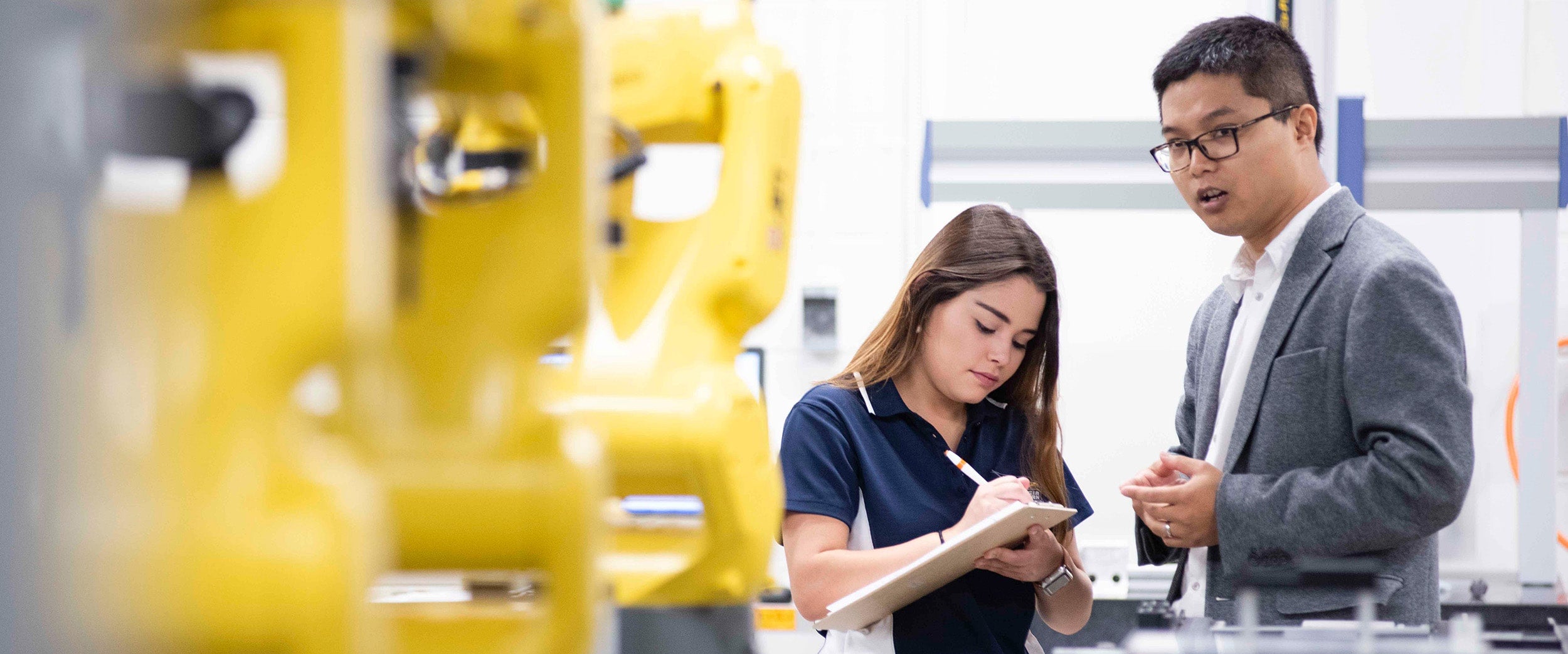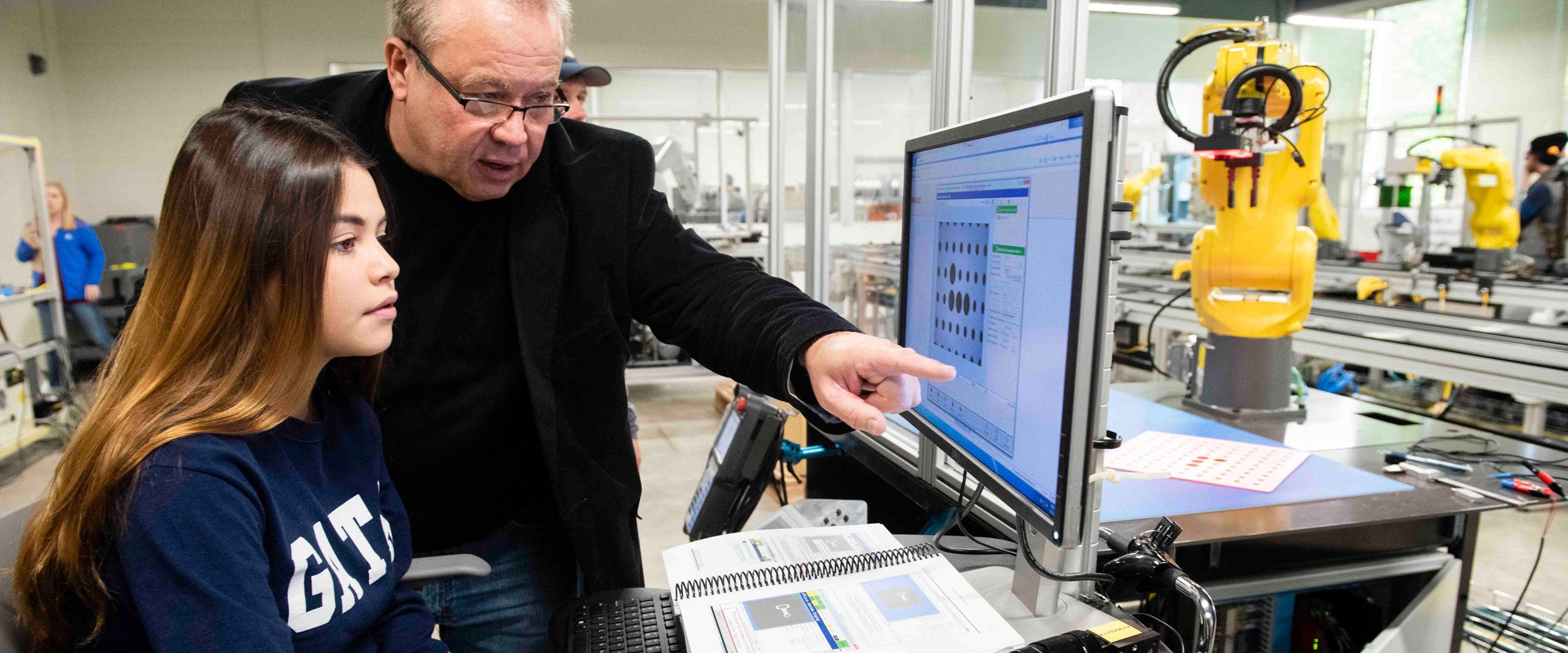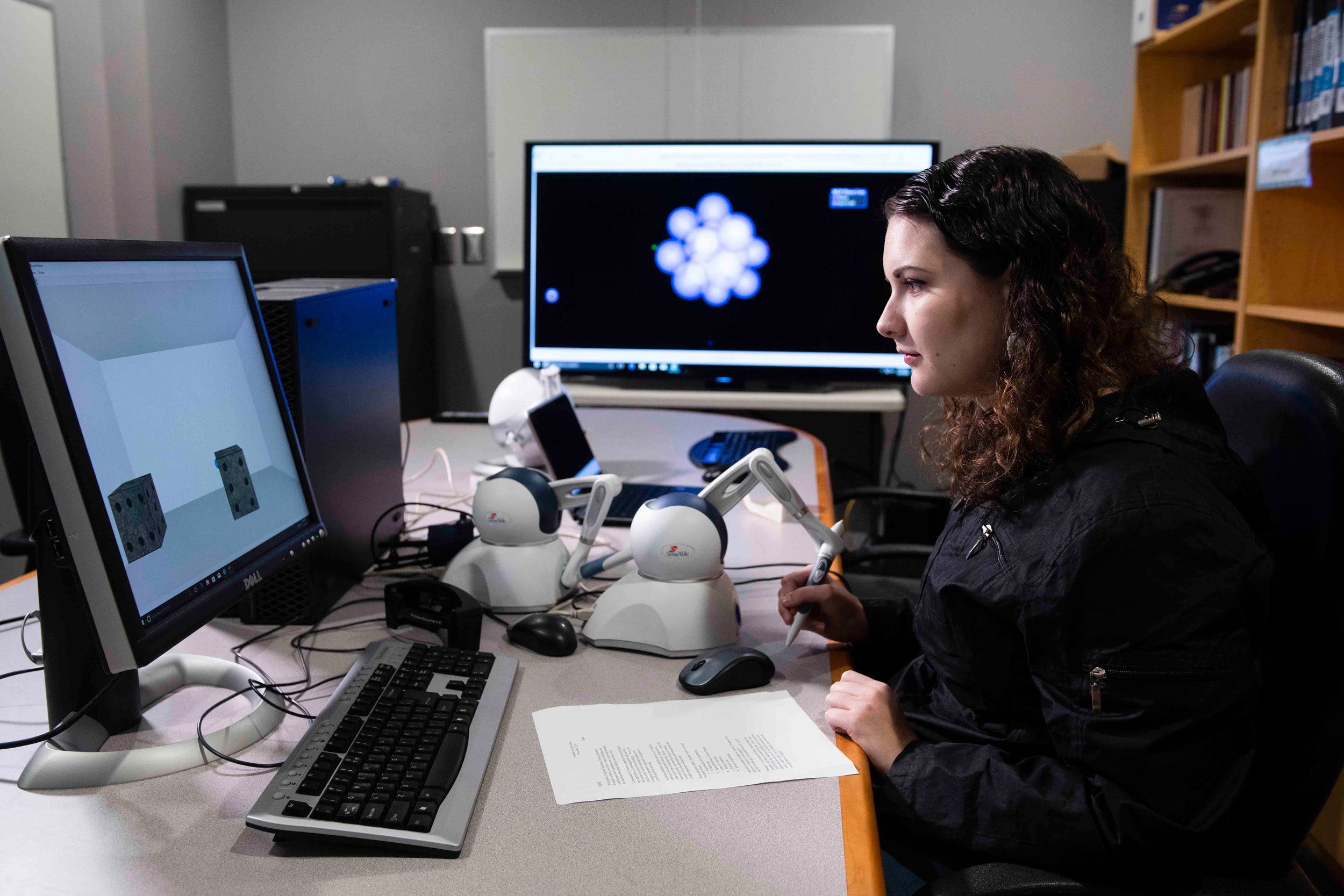Design the tools and systems that produce everything from nanoscale devices to multi-ton machines with a Bachelor of Science in Manufacturing Engineering from Georgia Southern University. Work with robots, software, machine tools, automated machinery and other instruments as you shape the future of industry.
Locations
- Statesboro Campus (In Person)
Why Major in Manufacturing Engineering at Georgia Southern?
- Get hands-on in our new, $60 million Engineering and Research Building.
- Accredited by the Engineering Accreditation Commission of ABET.
- Pursue an internship or co-op for valuable on-the-job training.
- Help fill a rising demand for well-trained, tech-savvy manufacturing experts.
- 130 credit hours to completion.
Manufacturing engineers are industrial problem-solvers who bring together all the tools at their disposal — equipment, personnel and methods — to make products safely and efficiently. As a manufacturing engineer, you’ll play a crucial role in creating the systems that produce goods sold all over the world, turning to a mix of data, technology and engineering principles to do so.
Your job will call for you to integrate robots, industrial controllers, software, machine tools, automated machinery, material processing equipment and additive manufacturing. Ahead of internships and co-ops, you’ll explore each hands-on in our Engineering and Research Building, a 140,000-square-foot hub that opened in 2021. Here, you’ll learn on the same up-to-the-minute technology you can expect to find on a modern factory floor. Just as importantly, you’ll find mentors in dedicated faculty who are as passionate about the field as your future.
And that future is bright. When companies seek students who can start contributing right away, they look to Georgia Southern: We offer the only undergraduate manufacturing engineering program in Georgia, and one of just two ABET-accredited programs in the discipline in the Southeast.
Ready to Apply?
What Can You Do With a Bachelor’s in Manufacturing Engineering?
A bachelor’s degree in manufacturing engineering puts you in demand, and many of our students receive job offers before they even graduate. It’s easy to understand why: Manufacturing engineering careers are growing at a rate four times faster than the national average.
Where our graduates work:
- AT&T
- Delta Air Lines
- Eagle Motorsports
- Gulfstream Aerospace
- Kimberly-Clark
- Mitsubishi Power Systems Americas
- NASA
- Textron Specialized Vehicles
- U.S. Army
- U.S. Navy
What our graduates do:
- Manufacturing engineer
- Production supervisor
- Process engineer
- Quality engineer
- Robotics engineer
Manufacturing Engineering at Georgia Southern
You don’t just want to make things — you want to make them better. Georgia Southern gives you the tools to do just that.
What You’ll Learn
Unlike many other engineering programs, Georgia Southern’s BS in Manufacturing Engineering relies on a kinesthetic approach — one based on moving and doing. While you’ll still be in a classroom, extensive hands-on laboratory experiences introduce you to fundamental and advanced manufacturing techniques, including additive manufacturing, advanced materials, robotics, automation and more.
You’ll put your knowledge and experiences to the test with a required capstone project, in which you’ll design and develop a product and/or process to mass-produce it.
See the CurriculumBuild Your Experience
As a manufacturing engineering major, you’ll enter this hands-on field with a running start, thanks to a mix of internships, state-of-the-art tools and meaningful research projects.
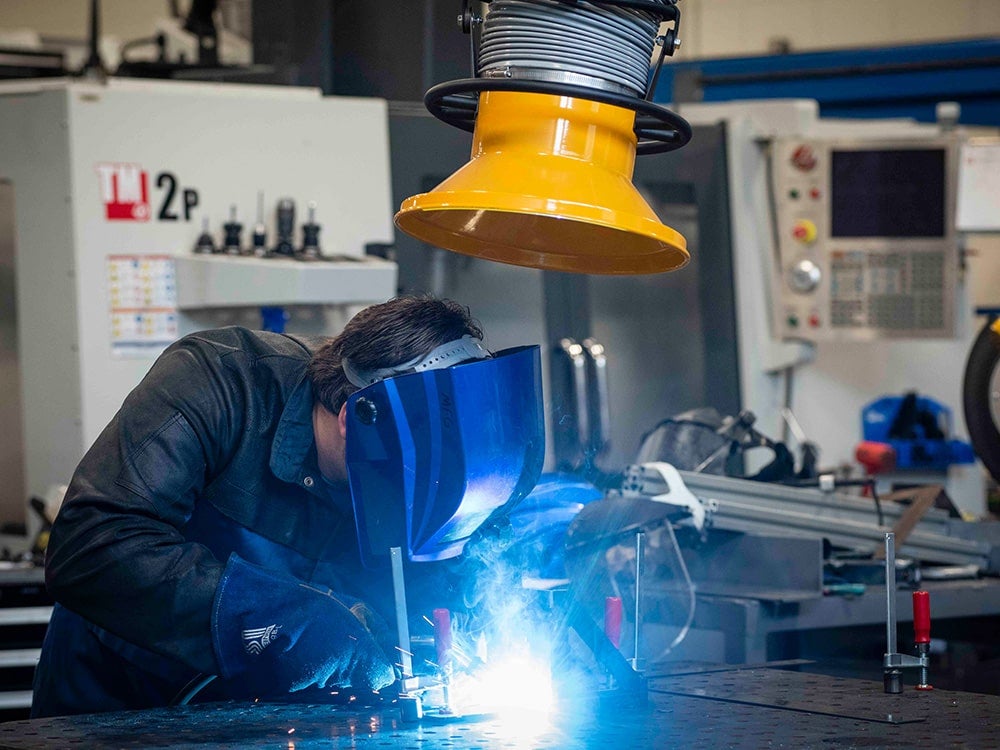
Internships and Co-ops
There’s no substitute for experience, and an internship or co-op — typically a full-time, paid position — is one of the best ways to build yours. As part of the team, you’ll have the chance to see how businesses operate and benefit from working alongside mentors who can show you how it’s done.
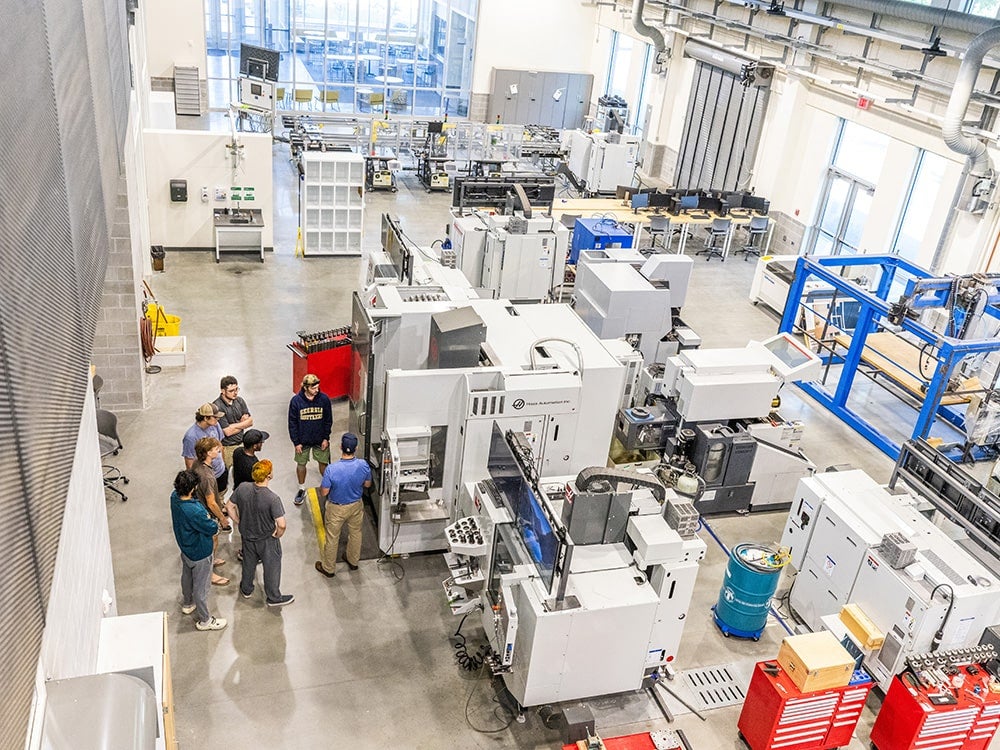
Advanced Facilities
The new Engineering and Research Building showcases cutting-edge innovation. We’ve future-proofed your education with a high-bay manufacturing floor, class 10,000 clean lab and a full complement of CNC, robotic, and metal, polymer, and bio-additive manufacturing equipment.
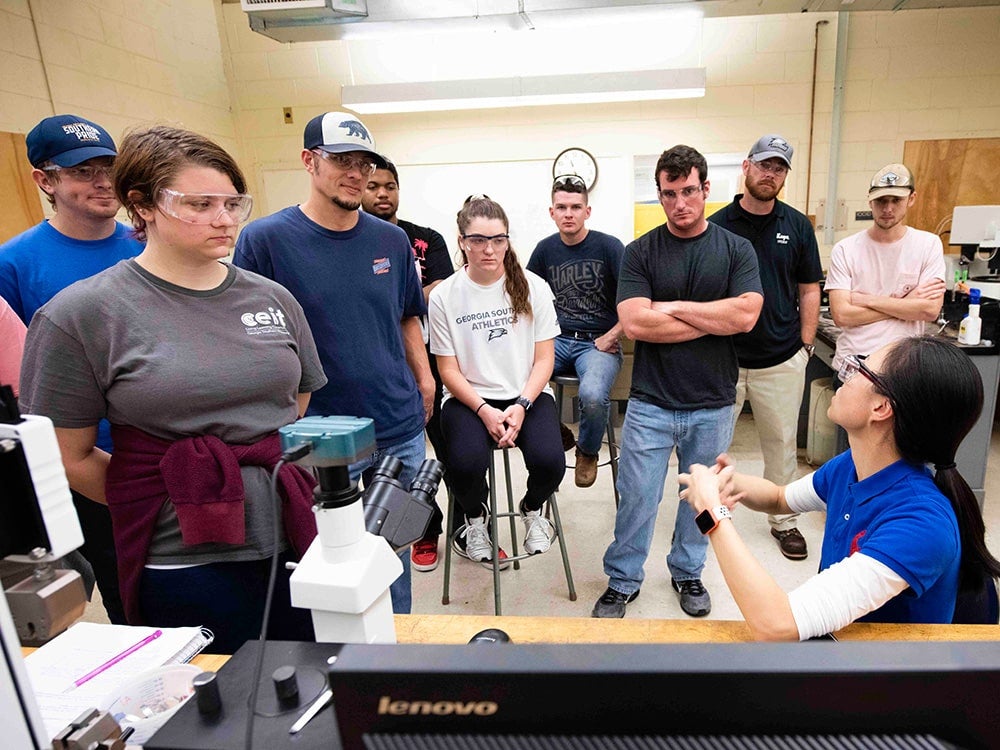
Get Involved
Join the Society of Manufacturing Engineers (SME) and Society of Women Engineers (SWE) to tap into even more opportunities for personal and professional growth. Build your network by meeting alumni and other engineers, participate in community service projects and stay up-to-date on developments in the field.
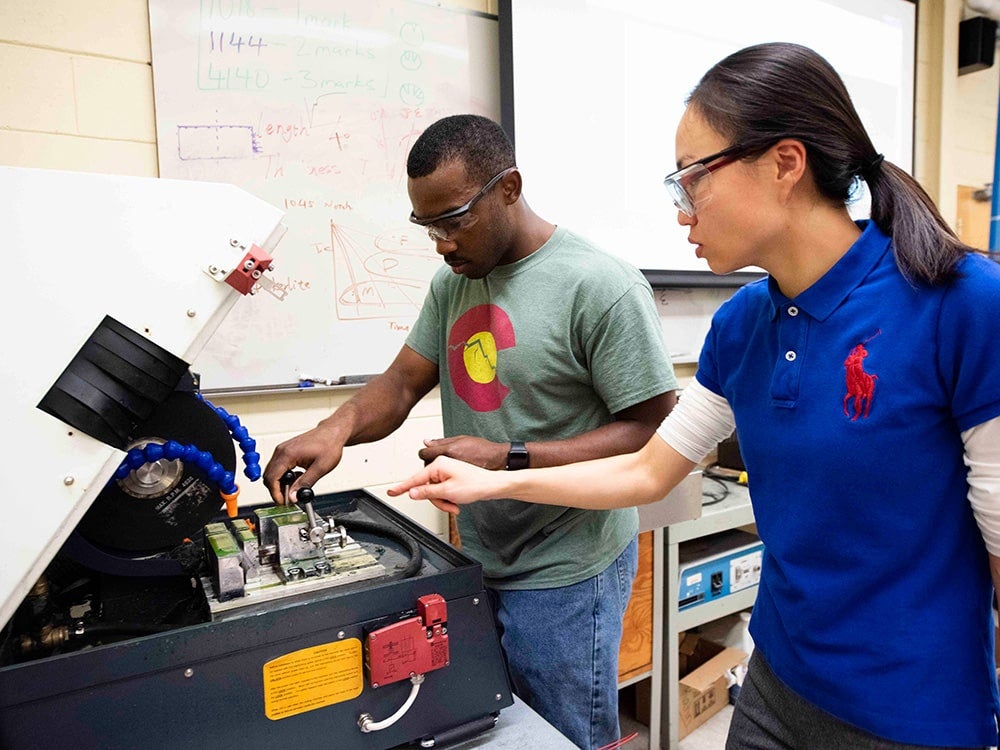
Student Research
Undergraduate research delivers results that go far beyond what you’ll find in the lab. You’ll draw on your experiences as you learn from a faculty mentor, collaborate with a team and develop problem-solving skills you’ll use for years to come. Our annual PCEC Research Symposium gives you a chance to demonstrate what you’ve learned to others.
“The program is amazing. They have hands-on experience, they have close relationships with the professors, everything is industry-standard. In fact, the machines they have at Georgia Southern are the same exact machines that I have at my workplace. It’s an amazing program. I think it prepares students very well — I definitely wouldn’t be here today if it wasn’t for that program at Georgia Southern.”
Want to Learn More?
Explore essential information about our BS in Manufacturing Engineering program, including application details, accreditation status, and licensing disclosures. Gain insight into the program’s credibility and requirements to help you start your journey toward success with the knowledge you need.
Follow these steps to complete the Georgia Southern application:
- Create an application account.
- Complete our online application using the PIN you received after creating your application account.
- Once complete, pay the $30 application fee or upload a valid fee waiver. Previous Georgia Southern applicants and dual enrollment students do not need to pay the fee.
You can check your application status at My.GeorgiaSouthern.edu/admissions three days after completing your application. This page contains live information about your admission status, including a checklist of missing documents we need to make a decision.
Apply as a First-Year Student Transfer to Georgia SouthernThe Accelerated Bachelor’s to Master’s (ABM) degree program is intended for current undergraduate students in the Department of Manufacturing Engineering at Georgia Southern University. It produces a pathway allowing students to earn both a bachelor’s and a master’s degree in the field within five years.
In accordance with Southern Association of Colleges and Schools Commission on Colleges (SACSCOC) requirements, students admitted to the Master of Science in Applied Engineering (MSAE)-ABM may use up to nine credit hours of graduate-level courses offered in the MSAE curriculum to meet the requirements of both the Bachelor of Science in Manufacturing Engineering (BSMfgE) and MSAE degree programs. SACSCOC requires 150 unique credit hours between the two programs. Because the MSAE-ABM program contains the required 150 unique hours between BSMfgE and MSAE degree programs, MSAE-ABM students may share a maximum of nine credit hours of graduate-level courses (5000G) to satisfy the requirements of both degree programs.
ABM Admission and Requirements
Regular Admission
For regular admission to the Accelerated Bachelor’s to Master of Science in Applied Engineering (ABM-MSAE) degree program, the applicant must:
- Be enrolled in the undergraduate manufacturing engineering program (BSMfgE) in the Department of Manufacturing Engineering at Georgia Southern University.
- Have completed at least 25 credit hours of undergraduate coursework in the MFGE discipline, including MFGE 2531, MFGE 2142, MFGE 2533, MFGE 2239 and MFGE 2534.
- Have a 3.0 or higher Georgia Southern Institutional GPA.
ABM programs do not allow provisional admission and are designed for students who have demonstrated a high level of undergraduate academic performance that validates their ability to be a successful graduate student. Students who do not meet the minimum requirements for regular admission may be granted admission to the program upon approval of an admissions committee consisting of at least the Department Chair and the Graduate Program director.
ABM Degree Requirements: 30 Credit Hours (Thesis and Non-Thesis)
A minimum of 50% of courses for the Master of Science in Applied Engineering degree program must be taken at or above the 6000 level.
A student in the ABM program will be allowed to use up to nine credits of MFGE 5000G-level courses offered within the Manufacturing Engineering program to meet the requirements of both bachelor’s and master’s degree programs.
Maintain a cumulative graduate GPA of 3.0 (grade of “B” or better) in their graduate degree coursework (including the nine credits of graduate coursework shared with the undergraduate degree).
Meet all requirements for both the BSMfgE and MSAE degrees.
An undergraduate student enrolled in graduate classes is limited to six credit hours of graduate coursework per semester.
About Accelerated Pathways at Georgia SouthernThe Manufacturing Engineering Program is accredited by the Engineering Accreditation Commission of ABET.
Completion of Georgia Southern’s Bachelor of Science Programs in Civil Engineering, Construction Engineering, Mechanical Engineering, Electrical Engineering and Manufacturing Engineering meet the educational requirements to begin the licensure process in the 50 U.S. states, the District of Columbia and five U.S. territories (American Samoa, Guam, Northern Mariana Islands, Puerto Rico and the Virgin Islands) by providing the coursework necessary to sit for the Fundamentals of Engineering Examination. Software Engineering does not have a specific PE examination. It is typically recommended that candidates sit for their FE exam toward the end of their senior year or soon after graduation. Visit the National Council of Examiners for Engineering and Surveying for more information.
Georgia Southern makes every effort to ensure information about educational requirements for licensure or certification is current; however, state requirements may change. Separate from educational requirements, state licensure boards may require applicants to complete professional examinations, background checks, years of professional experience, residence requirements, jurisprudence exams, training, etc. If you are planning to pursue professional licensure or certification in a state other than Georgia, it is strongly recommended that you contact the appropriate licensing entity in that state to seek information regarding licensure or certification before beginning an academic program. For more information and a list of applicable state boards, visit the Georgia Southern State Authorization and Professional Licensure page.
Faculty Feature
Across multiple industries, phased array ultrasonic testing (PAUT) is being used to detect faulty welds and compromised materials. Through a $188K GDOT grant, assistant professor Dr. Hossein Taheri, a nationally recognized Non-Destructive Testing and Evaluation (NDTE) expert, has been investigating its potential to streamline quality assurance processes and lower related costs.
About Dr. Taheri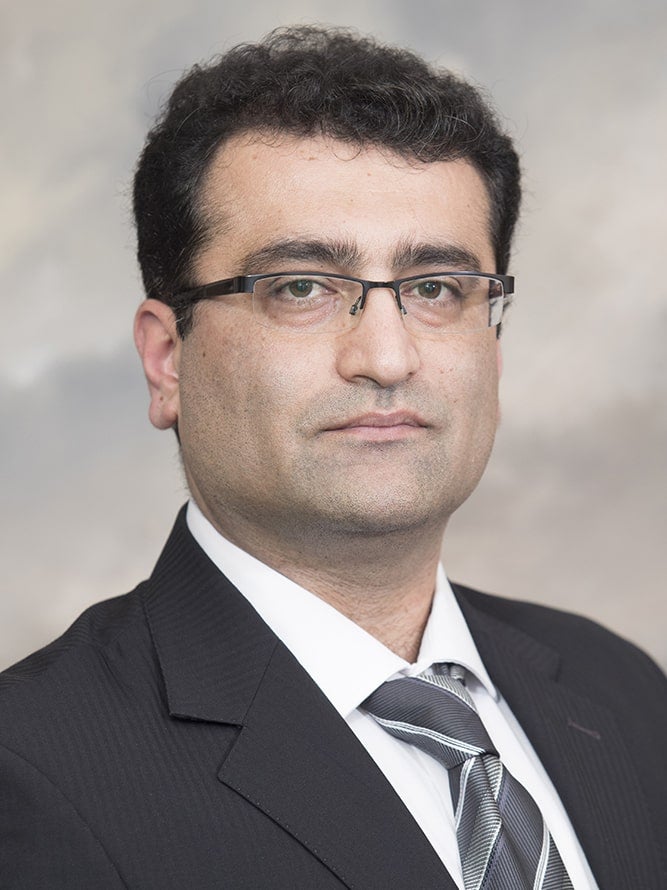
Related Programs
Accreditation
The Bachelor of Science in Manufacturing Engineering program is accredited by the Engineering Accreditation Commission of ABET, https://www.abet.org, under the commission’s General Criteria and Program Criteria for Manufacturing and Similarly Named Engineering Programs.

Take the Next Step
Before you build the tools and systems that make the products the world demands, build your education at Georgia Southern.
Contact Us
Manufacturing Engineering Program
Phone: 912-478-2464
Email: mfge@georgiasouthern.edu

